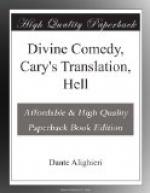To himself and his own blessings: and for this
He in the second round must aye deplore
With unavailing penitence his crime,
Whoe’er deprives himself of life and light,
In reckless lavishment his talent wastes,
And sorrows there where he should dwell in joy.
To God may force be offer’d, in the heart
Denying and blaspheming his high power,
And nature with her kindly law contemning.
And thence the inmost round marks with its seal
Sodom and Cahors, and all such as speak
Contemptuously’ of the Godhead in their hearts.
“Fraud, that in every conscience leaves a sting,
May be by man employ’d on one, whose trust
He wins, or on another who withholds
Strict confidence. Seems as the latter way
Broke but the bond of love which Nature makes.
Whence in the second circle have their nest
Dissimulation, witchcraft, flatteries,
Theft, falsehood, simony, all who seduce
To lust, or set their honesty at pawn,
With such vile scum as these. The other way
Forgets both Nature’s general love, and that
Which thereto added afterwards gives birth
To special faith. Whence in the lesser circle,
Point of the universe, dread seat of Dis,
The traitor is eternally consum’d.”
I thus: “Instructor, clearly thy discourse
Proceeds, distinguishing the hideous chasm
And its inhabitants with skill exact.
But tell me this: they of the dull, fat pool,
Whom the rain beats, or whom the tempest drives,
Or who with tongues so fierce conflicting meet,
Wherefore within the city fire-illum’d
Are not these punish’d, if God’s wrath
be on them?
And if it be not, wherefore in such guise
Are they condemned?” He answer thus return’d:
“Wherefore in dotage wanders thus thy mind,
Not so accustom’d? or what other thoughts
Possess it? Dwell not in thy memory
The words, wherein thy ethic page describes
Three dispositions adverse to Heav’n’s
will,
Incont’nence, malice, and mad brutishness,
And how incontinence the least offends
God, and least guilt incurs? If well thou note
This judgment, and remember who they are,
Without these walls to vain repentance doom’d,
Thou shalt discern why they apart are plac’d
From these fell spirits, and less wreakful pours
Justice divine on them its vengeance down.”
“O Sun! who healest all imperfect sight,
Thou so content’st me, when thou solv’st
my doubt,
That ignorance not less than knowledge charms.
Yet somewhat turn thee back,” I in these words
Continu’d, “where thou saidst, that usury
Offends celestial Goodness; and this knot
Perplex’d unravel.” He thus made
reply:
“Philosophy, to an attentive ear,
Clearly points out, not in one part alone,
How imitative nature takes her course
From the celestial mind and from its art:
And where her laws the Stagyrite unfolds,




